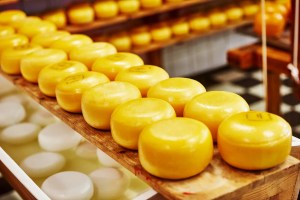During my travels through the beautiful, giant world of the interverse this week, I came across two stories about ‘replica’ products. Because I live and breathe food authenticity I follow stories like these with great interest. My mission as an authenticity expert is to help people to make sense of the huge amounts of information, media-spin and noise around the integrity and authenticity of food, beverages and supplements.
As I read these two stories of ‘replica’ foods, I was struck by how utterly different they are from each other. The first story is a tale of ‘replica’ cheese, which sounds like some kind of fake non-dairy product, perhaps masquerading as the real thing. The question of whether a non-dairy product should be called ‘cheese’ hit the headlines in Europe earlier this year when a German court ruled that products made without animal milk cannot be called ‘cheese’, leaving vegan ‘cheese’ suppliers wondering what to call their products. But this latest story had nothing to do with that; although the labelling of vegan cheese substitutes clearly has regulatory implications, I don’t consider this particular issue to be an authenticity problem as such; purchasers of vegan ‘cheese’ are most certainly aware that the product has been produced without animal milk.
The ‘replica’ cheese in this week’s story was parmesan, and no, not the kind containing unauthorised wood pulp by-products, which has also been in the news recently. This time, it seems that cheese makers from the Italian provinces of Parma, Reggio Emilia, Modena, Bologna and Mantua, who collectively identify their region as Parmigiano-Reggiano, have decided to pursue those from outside the area who use the product names Parmesan, Parmigiano and Reggiano for trademark breaches. So the ‘replica’ cheese is in this story is cheese made in the style of Parmigiano and Reggiano, but not actually originating from that region.

Is this an authenticity issue? Perhaps. In Europe, the cheeses in question are subject to rules of Protected Designation of Origin (PDO). Under these rules it is illegal to call a cheese Parmesan if it did not originate in Parmigiano-Reggiano and meet the strict manufacturing criteria of the Parmigiano-Reggiano Consorzio, an Italian consortium created by government decree. In fact, US food giant Kraft had to rename its grated cheese ‘Pamesello’ in Europe to comply with these requirements. In other parts of the world, the terms have come to be used as a generic name for the hard Italian cheese for which the region is known. The Parmigiano-Reggiano Consorzio have decided to pursue sellers of cheese all over the world for claimed breaches of trademark.
Are the Italian-style cheeses in the news this week ‘replica’ cheeses? No; they are real cheeses, made with animal milk and conforming to a certain regional style. Would I call them inauthentic? Perhaps. Authentic food is food that is what it claims to be. If a cheese is marketed with clear information about its place of origin, wherever that may be, then it is reasonable for a consumer to understand that it has been made in the style of Parma, rather than being made in Parma itself. So according to my definition, that makes it authentic, at least when sold outside of Europe. However, if the origin of the cheese is misrepresented by the seller, or on the label, then that makes the product inauthentic. And, in most jurisdictions, illegal as well.
Replica wines
From ‘replica’ cheeses that are not exactly fake, my next stop on the web provided a fascinating insight into the emerging niche market of ‘replica’ wine. Two companies are reinventing wine production and it is now possible to purchase a wine-like alcoholic beverage made without using grapes or fermentation processes. In this case, I would say the use of the term ‘replica’ is perfect. Ava Winery claims to have modelled its flavour profile on Dom Perignon’s Champagne, using a proprietary method that combines amino acids, sugars and ethanol in precise quantities. Another company, Replica, offers a range of ‘masterful recreations’ of award-winning wines created by scientists using laboratory analyses of key flavour characteristics.
While traditionalists may throw up their hands in horror at the thought of making that most noble of fermented drinks in a laboratory, there is nothing inauthentic about the beverages made by these two companies. Both websites have very clear messages around the authenticity of their products. Ava Winery states that their company is “in no way affiliated [with] Dom Pérignon® or Moët Hennessy USA, Inc. which does not endorse our products.” Replica says that “Originality is overrated, especially when it’s overpriced.” Both are unapologetic about their mission to recreate fabulous flavours using science. Replica’s range even includes a gorgeously packaged beverage called ‘Knockoff’ that is said to mimic a California Chardonnay.
Authentic, science-loving and beautiful-looking, what’s not to love? I can’t wait to try some.
